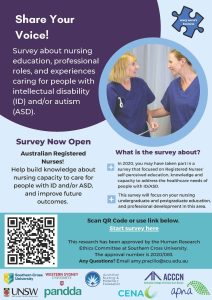The ‘Every Nurse’s Business’ free CPD program, developed to build registered nurses’ capacity to provide quality care for people with intellectual disability (ID) and/or autism (ASD), was recently extended until June 2024.
RN’s nationwide who have not yet accessed the three available levels of training are being encouraged to take advantage of the educational opportunity to boost their knowledge and skills in this important area.
Launched three years ago, the project has been focused on improving access to mainstream healthcare for this cohort, including reducing negative healthcare outcomes and experiences for people with intellectual disability (ID) and/or autism (ASD). Research shows that people with ID and/or ASD experience more chronic and complex health conditions, greater hospitalisation rates, longer hospital stays, and more complications following hospitalisation when compared to the general population.
The program is separated into three learning levels – foundational, intermediate, and advanced – and covers six domains (modules) of content relevant to caring for people with ASD and/or ID: care imperatives; communication to individuals with ASD and/or ID; understanding communication from individuals with ASD and/or ID; environments of care; supporting positive behaviour; making things go well; and introduction to the NDIS. Registered nurses who undertake the training learn through interactive content, videos, quizzes, and interviews with experts.
Project lead, Professor Andrew Cashin, Professor of Autism and Intellectual Disability at Southern Cross University (SCU), says people with ID and/or ASD experience some of the worst health outcomes among all groups in Australia, making addressing the issue a matter of urgency.

The projects initial 2020 survey of 693 RNs’ self-perceived comfort, confidence, and knowledge to care for people with ID and/or ASD was extremely low. Further, survey respondents reported very low levels of undergraduate content exposure, clinical placement, and continuing professional development (CPD) relevant to caring for this cohort.
“That was a fairly new finding that was a really important one,” Professor Cashin says.
“Historically, unless you’re a specialist in that area, and we know that [the] specialist role has gone as we move to comprehensive care, that really all the other programs historically have had very little content related to caring for people with intellectual disability and autism.”
The learning platform, accessible for free to ANMF members and other nursing affiliates, has seen over 1,000 nurses actively engage with its content. While more than 800 CPD certificates have been issues across all three levels of learning.
“It hasn’t been as much as we’d hoped,” Professor Cashin says.
“We did do another study on the side and we’ve published that and found that CPD was certainly affected by the [COVID-19] pandemic as nurses were run off their feet and exhausted through that. This project unfortunately ran across that time.”
However, Professor Cashin points out that research looking into how the online CPD program is helping nurses build their capacity to care for people with an intellectual disability, including confidence levels, has shown that the learning is effective.
“It does show that if you provide education then you get a difference in those parameters,” he says.
“Even though we can’t say it’s causative, there has to be an association if people are feeling more confident in knowing what to do, more comfortable in doing it, and have that sense of competence that the care is going to be different. We might be starting to put a dent into those health outcomes.”
The ‘Every Nurse’s Business’ project is currently conducting its final survey to find out more about nursing education, professional roles, and experiences caring for people with ID and/or ASD. The survey is focusing on nursing undergraduate and postgraduate development and will build on the previous survey.
“There’s a few parameters in there related to the climate, which nurses practice in at the moment, which might give insight into not only what’s happening with intellectual disability and autism, but in that broader space of person-centred care, and how nurses are able to maintain that in what has been a bit of a resource-poor and demand-rich environment,” Professor Cashin explains.
“So, it has some other interesting aspects. And it’s not just a case of having done it [the survey] once and why do it again. It’s actually extending what we’ve done to get a really clear understanding of where nursing’s at, but also, what are some of the other environmental factors that could change, that would enable nurses to better express their scope of practice and move into providing more thorough care in this domain.”
Take part in the ‘Every Nurse’s Business’ survey here
Access the ‘Every Nurse’s Business’ free CPD program here








